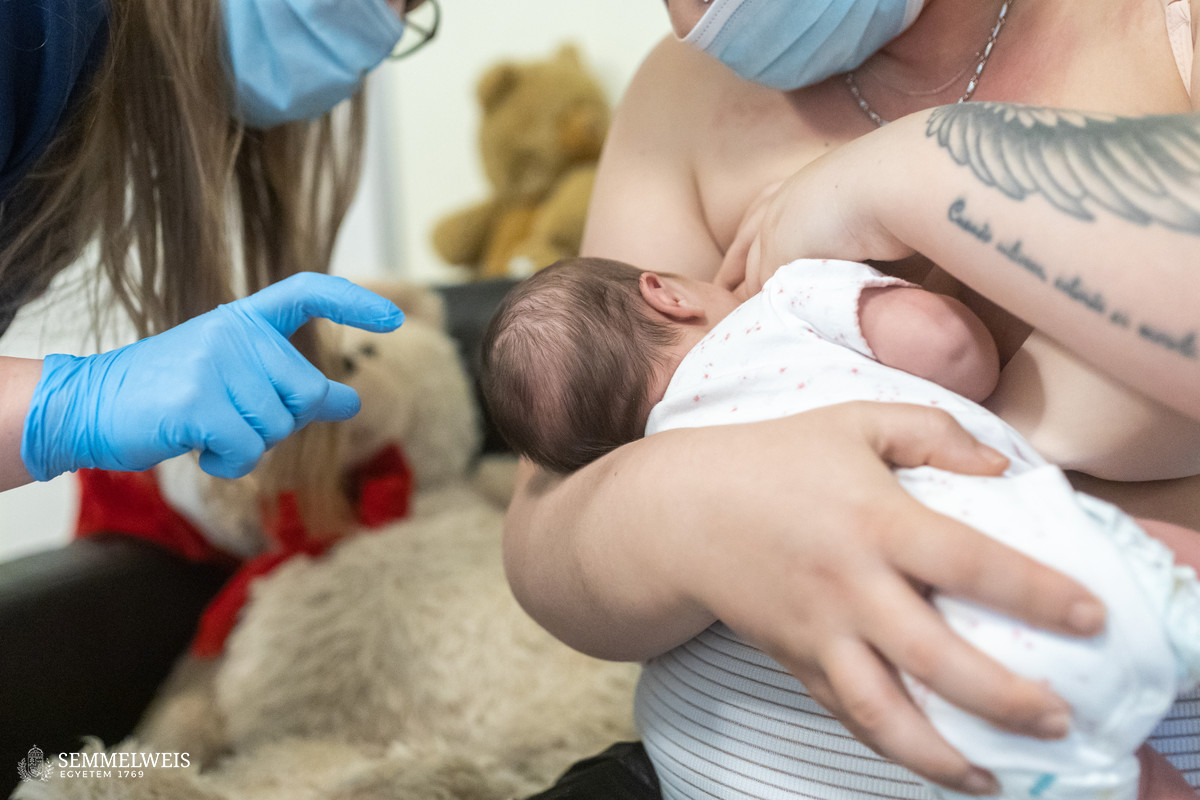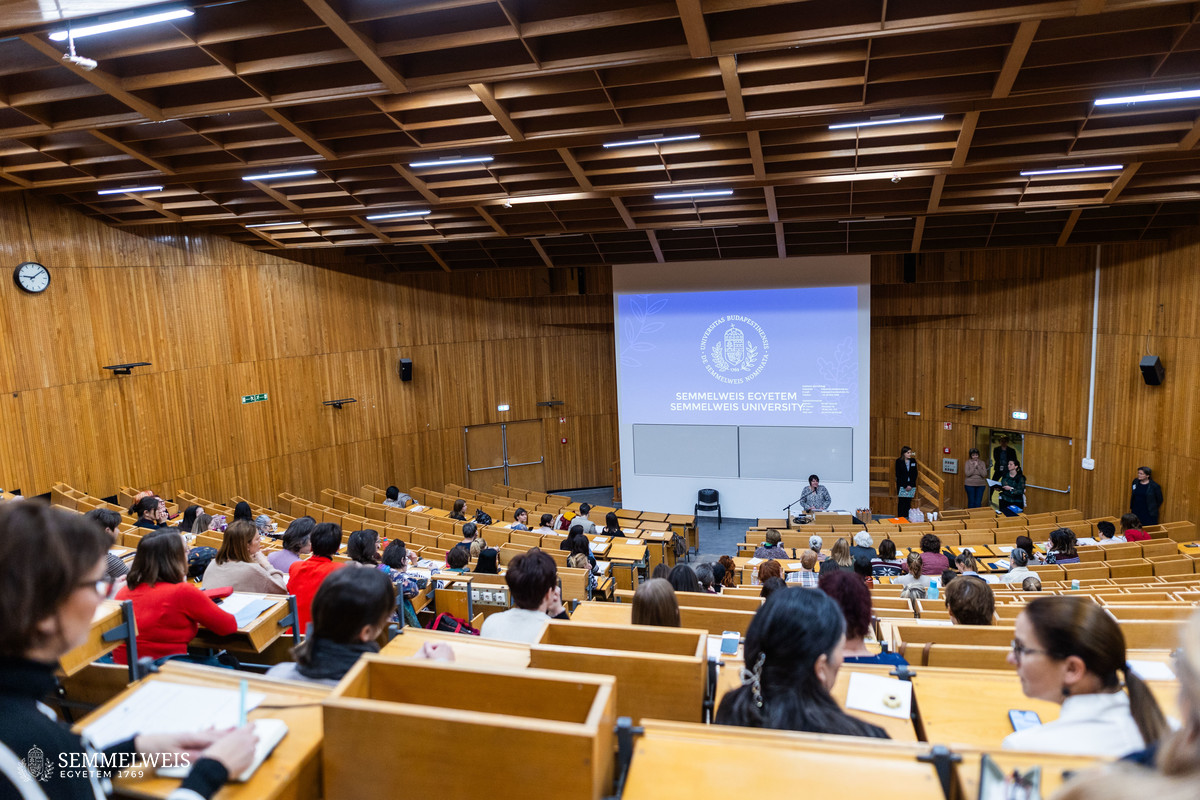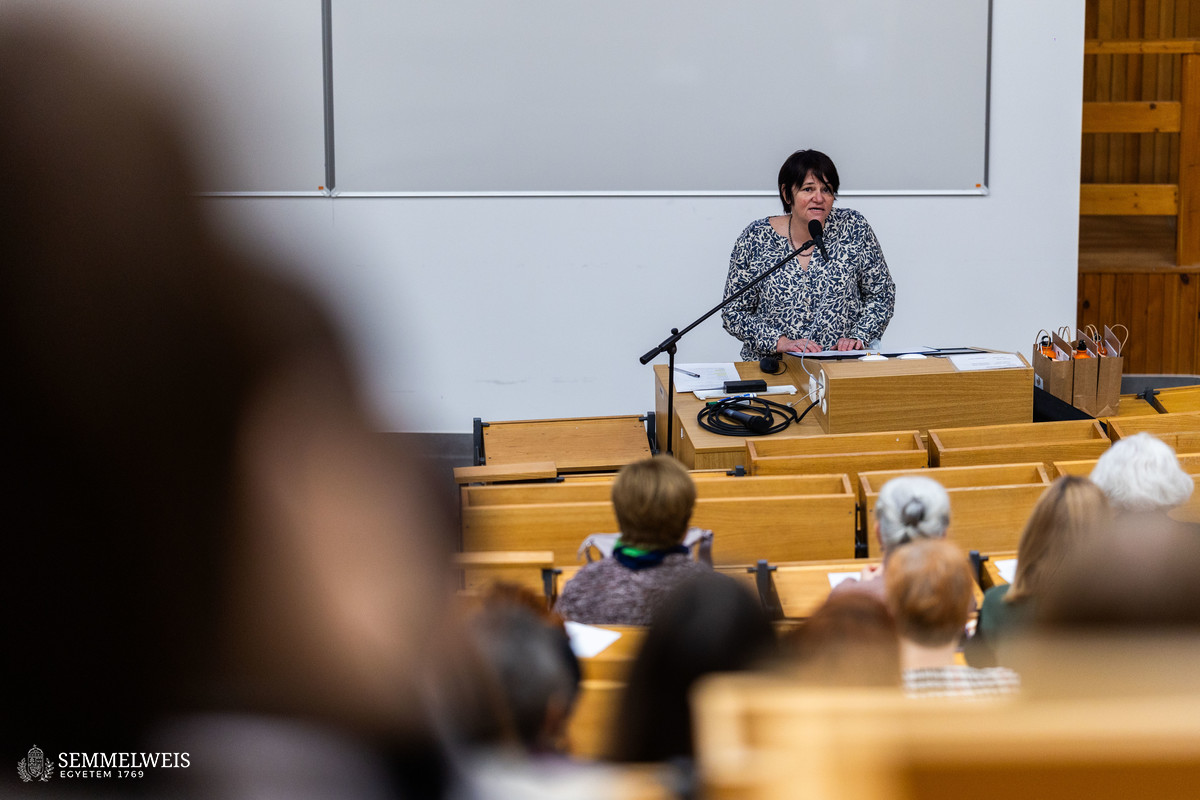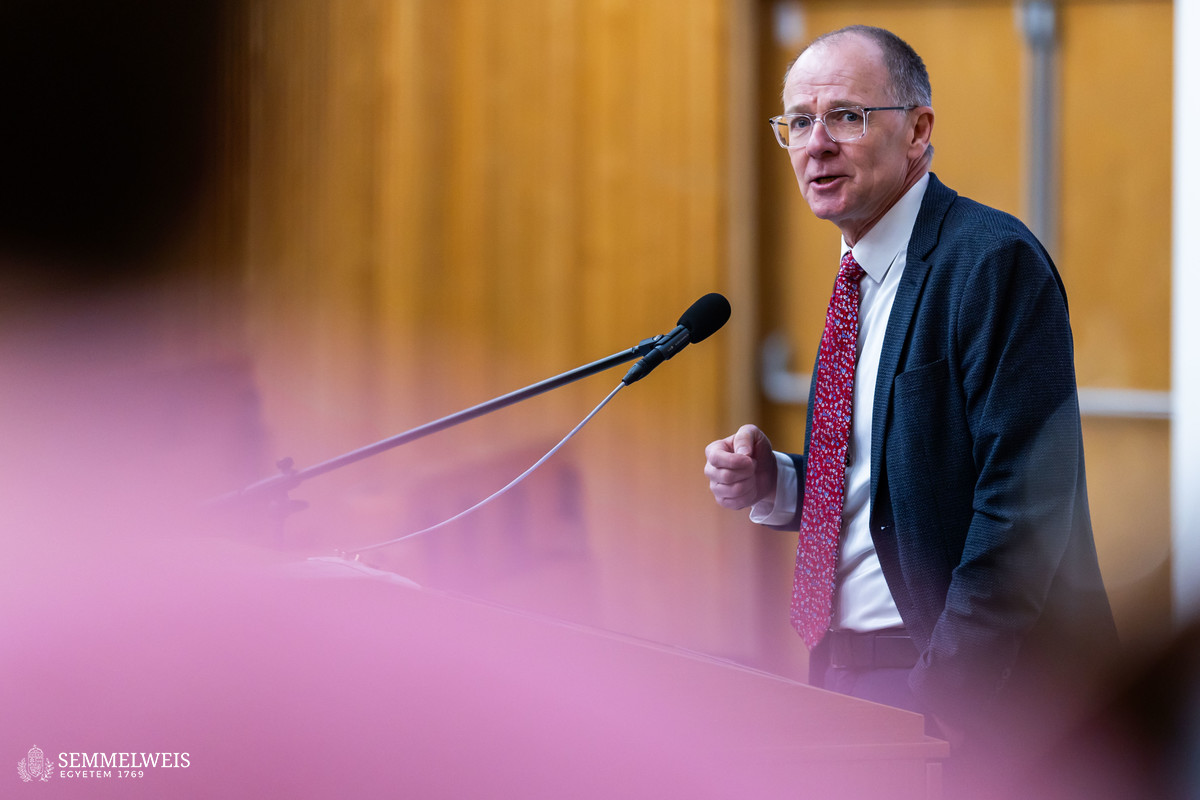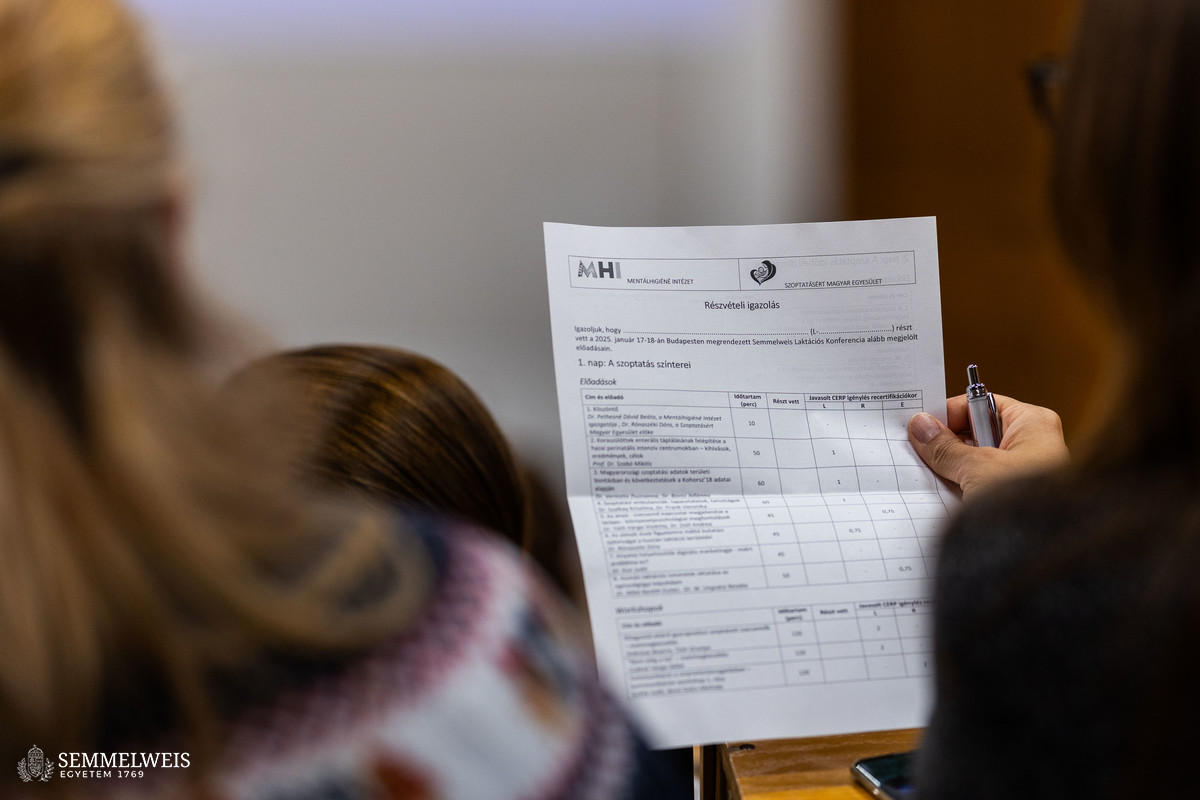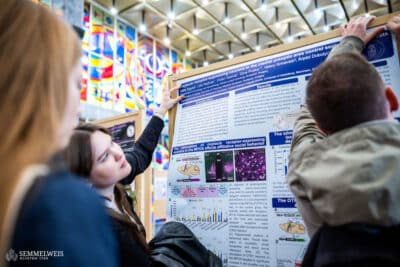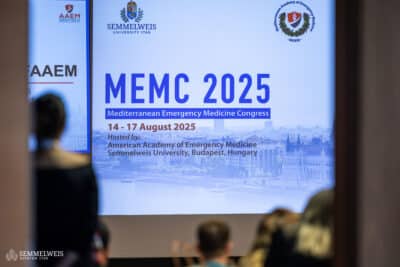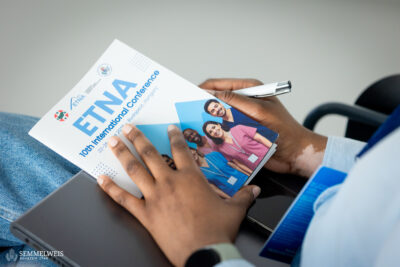The first Semmelweis Lactation Conference, held on January 17-18, 2025, featured 18 presentations and six workshops on breastfeeding.
On the first day, Dr. Miklós Szabó, Head of the Department of Neonatology at Semmelweis University, spoke about the enteral feeding of premature infants, a crucial part of the professional work in the neonatal intensive care centers, and the amendment of the relevant professional protocol. He presented convincing statistics to show that breastfeeding had become a common practice in the last ten years. Revolutionary changes have taken place in Hungarian institutions regarding the methodology and quantity of enteral feeding, which have had a significant positive impact on the short and long-term health of preterm infants weighing less than 1,500 grams.
It is becoming increasingly common for institutions to employ lactation consultants to assist mothers in breastfeeding and pumping.
Dr. Zsuzsa Veroszta, Senior Research Fellow at the Hungarian Demographic Research Institute of the Hungarian Central Statistical Office (KSH), and Dr. Julianna Boros presented the results of the Kohorsz’18 research on breastfeeding. Dr. Zsuzsa Veroszta provided insights into the geographical distribution of the large-sample representative survey (e.g. why there is a huge difference in the ratio of breastfeeding mothers per county), the difficulties of collecting data on breastfeeding, and some exciting correlations that provide valuable lessons for understanding the state of families, mothers, and breastfeeding in contemporary Hungary.
Evidence has also shown that mothers who bed-share with their baby and do not give pacifiers breastfeed longer.
Dr. Violetta Tóth Varga, Assistant Professor of Environmental Psychology at the Faculty of Pedagogy and Psychology (PPK) of Eötvös Loránd University (ELTE), gave an exciting presentation on infant observation as an important tool for breastfeeding support. The presentation on the Breastfeeding Outpatient Clinic of the Bethesda Children’s Hospital maintained by the Reformed Church in Hungary pointed out that interdisciplinary and multidisciplinary collaboration was required to tackle some of the challenges of breastfeeding. All pediatricians or residents of the outpatient clinic completed a postgraduate training course in lactation counseling at Semmelweis University. For the second year in a row, all students of the lactation training course have done an internship at the clinic, where they can shadow the counseling and gain experience in the workings of a hospital breastfeeding clinic. Dr. Veronika Frank presented a similar initiative at the Bókay Street Department of Semmelweis University’s Pediatric Center.
Dr. Dóra Rónaszéki, President of SZME, summarized the scientific advances and major trends in human lactation over the last two years. In her presentation on digital marketing of commercial breastmilk substitutes, Dr. Judit Kun reported on several alarming trends, the most striking being the progressive growth of formula sales in Hungary.
One way to improve the quality and availability of breastfeeding support is to educate health professionals about this topic.
Based on the lessons learned from an elective training module on breastfeeding, Dr. Eszter Mikó-Baráth, a lecturer at the University of Pécs, pointed out that even a 12-hour course could lead to a noticeable improvement in the knowledge and attitude of the participants. Semmelweis University’s Lactation Consultant course is a 217-hour, 90-credit specialist training based on international standards, which allows students to explore the topic in a more detailed, practice-oriented manner, summarized Dr. Renáta W. Ungváry, Assistant Professor at the Institute of Mental Health and Program Director of the Lactation Consultant course at Semmelweis University.
Eating, sleeping, crying, breastfeeding, and self-regulation are closely interrelated.
The opening presentation of the second day focused on the disadvantages of a nutrition-centered approach to breastfeeding, as opposed to the developmental and behavioral approach, which allows for a differentiated and empathic response to breastfeeding problems at different stages of development. Closely related to this topic, Judit Gaborják Kovács’s presentation on responding to infant and early childhood sleep disorders in breastfeeding counseling practice was complemented by a practice-oriented workshop.
With regards to supporting mothers who are reluctant to breastfeed, lactation consultant Laura Do Dinh emphasized that breastfeeding aversion response (BAR) is more common than one might think and is often latent in everyday practice. However, understanding this phenomenon allows for compassionate and non-judgmental assistance to affected mothers. Habilitated Assistant Professor Dr. Viola Sallay spoke about the method of experience mapping, which enables family members to become aware of and consciously shape the domestic emotional and relational processes with the support of a professional. This allows them to create safe spaces for family connections, such as breastfeeding, taking into account their individual experiences.
Dr. Réka Vass used her own data to demonstrate how the presence and level of maternal hormones in breast milk can influence infant growth, and how hormone levels are shaped by the storage and pasteurization of the pumped milk. These findings show once again that there is more to breast milk consumption than just the quantitative aspects.
Judit Sződy shared her 12 years of experience working in the maternity ward of the Uzsoki Street Hospital in Budapest: She was the first lactation consultant employed by the hospital to welcome lactation consultant students for internship. Dr. Anita Márkus, a neonatologist, pediatrician, and lactation consultant, gave a presentation on the baby-friendly approach and achievements of the hospital in Siófok, Somogy County.
The presentation by Dr. Veronika Bóné, a Research Fellow at Semmelweis University, and Dr. Judit Kun, a lactation consultant, detailed the impact of obstetric interventions on breastfeeding, showing the wide range of factors that can ultimately affect the success of breastfeeding, as revealed by a study funded by the Hungarian Committee for the Promotion of Breastfeeding. Finally, Dr. Fruzsina Erdélyi of the Breastfeeding Outpatient Clinic at the Bethesda Children’s Hospital presented a new take on a common problem, the mastitis spectrum, and described new approaches to the pathomechanism based on a 2022 US guideline.
Dr. Renáta W. Ungváry
Translation: Judit Szabados-Dőtsch
Photos by Bálint Barta – Semmelweis University
